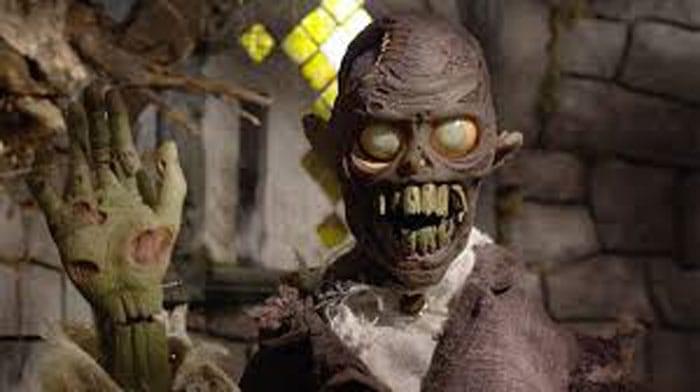
If you want to get a good impression of how vast indie film is, that is if you don’t want to go for the feature films right away, then you take a look at shorts. Atomfilms.com and ifilm.com are good examples of this and with enough time on your hands, you get a good look at many filmmakers who seem to tirelessly make shorts, perhaps on the road to longer running times. Then there’s the other route for this sort of thing: the short film compilation, usually on DVD.
“Loud Shorts! Volume One” is a good example of this, featuring six short films. Three contain twists at the end. One is merely ok while another focuses on a small story in an enormous historical happening.
6:30 ^ *1/2 ^ Directed by Blake Calhoun ^ This is a prime example of technique for the sake of technique. Trent (Johnny Sneed) sits in his car in the parking lot of a Step-In Food Store, planning to rob the place. A black car pulls up and a woman gets out, only to get back into her car a shot later, looking at him for a few seconds and then pulling away. It gets stranger when he gets out of the car, ready for action, but a payphone rings and he answers it because after all, this wouldn’t be a short film if he didn’t answer it. A voice on the other end tells him to go to the interaction where he can be seen or the deal’s off. It’s not clear what deal this voice is talking about.
Kelly (Rachel Kelly) then becomes the main focus, as we see her exercise, meditate, and smoke a few cigarettes at different times. As it turns out, she was the one in that black car in the beginning, so now we see what’s going on from her point of view, before she gets to the Step-In convenience store. Finally, Dwight (Troy Grant), a pothead makes his appearance and that seems to be it from the likes of it. Dwight eventually meets up with Trent, who’s still confused about the deal that’s going on. After all, he didn’t come to the convenience store to make any kind of deal.
The way the story backtracks and goes forward is not such a big deal as it is that there’s a feeling of emptiness when it’s over, signaling a waste of time. Sure there’s ample opportunity to watch the characters in action, but to get to know them a bit more than that, to actually care what transpires; there’s none of that. There’s no feeling of involvement, of interest, and that’s worse than just using a technique without knowing where you’re going.
A Day at the Office ^ ****1/2 ^ Directed by David Maddox ^ There are two ways to make a sudden twist work successfully. First, it should ride in step with the rest of the story and not jut out like a Viagra-induced erection. Secondly, in order to make it work, the film needs to have its best poker face in place. Drown it in cement if you have to. Some films use twists for the sake of generating excitement when there’s been none. “A Day at the Office” has a good one because not only do you hardly expect it, but the film is long enough that you sink good and deep into the world of a bedraggled homeless man, trying to reach out for whatever money he can from passersby willing to give up a dollar here and there. However, this homeless guy is a strangely crafty one. He uses a wheelchair and proves at many points that he doesn’t need it, but only lifting himself long enough to switch legs for the “legless routine” and then putting both legs up to try to garner sympathy for having no legs. He changes his cardboard sign at will and there’s one point where it reads, “Former Apple Employee”.
The homeless problem is a grievous one, but everyone involved in this production are not around to try to change that. Slowly, but surely, each scene helps build up to something that you’ve never seen and even if you think you’ve got it now, you surely don’t.
Burning the Grump ^ **** ^ Directed by David Ahearn ^ Owen (David Wilk) is making his first movie and wants desperately to talk to actress Audrey Harris (Kristin McCollum) about accepting a part in it. Sal (Johnny Sneed) and Hatch (Oliver Tull) both say that she’s a has-been, this while waiting on an adjacent driveway near her house, to talk to her. It was Hatch’s job to arrange a meeting with her, because he could, but as it turns out, he didn’t, leaving Owen to try to figure out another way to talk to her without having the cops come and peg him as a stalker. At first, “Burning the Gump” almost seems like a pale “Pulp Fiction” imitator, with its dialogue amidst the three, first about Hatch’s real name which is Stacy, and then how to properly pronounce “Buscemi” as in Steve Buscemi, whom Hatch has worked with three times, while Owen has done nothing in movies. Once Audrey pulls into her driveway, that’s when the “Pulp Fiction” influence is waved off. First, Hatch greets her, possibly explaining that they’re having car trouble and then Owen and Sal walk towards the house, followed by alarm bells loudly going off, with the men running out of the house with actress in tow. Those alarm bells were not smoke detectors, but a panic button that Audrey has in her house and this has led to her being kidnapped.
Now there are more problems to face and for some, this may have more benefits than problems. Plus, there’s a betrayal in the ranks, which serves as such a surprise at the end that you may have to think about it once over before it fully hits.
Hero ^ *** ^ Directed by Cliff Richhart ^ So far, there’s been an empty storytelling exercise, a savvy homeless man, and a filmmaker hoping to snag the actress he’s looking for, only to find out that he may be the one who’s been snagged in a completely different way. Heck, the Civil War should be thrown in for good measure and “Hero” demonstrates yet again why many filmmakers approach the famous wars with such fervency. The Civil War, WWI and WWII, among others were big, imposing wars to which the history of them are learned in many classes during countless years of education, pointing out the heroes and villains of each one, depending on what country you’re in. However, it’s necessary to dig deeper. How many films can be done on the Battle of Gettysburg, the bombing of Pearl Harbor (Let the most recent one be the last), and others? The big events are sometimes hard to do logistically and budget-wise. Many filmmakers opt to take a more personal route, looking through the eyes of a soldier merely fighting his share of a war, such as in this one.
The two men involved are a Rebel soldier (Paul Williams) and a Union soldier (Stephen A. Elkins). There’s nothing famous about them that can be found in tons of history books, but are merely two men who joined opposite sides for different reasons, but share a brief moment connecting them, even when their uniform colors and ideals do not. The Rebel soldier trains his gun on the Union one, cocking the gun and preparing to fire. But after striking a match to light up for a smoke, the Union soldier takes out a photo of his loved one. The Rebel soldier takes out a locket with his beloved’s picture in it and that’s where the moment is. But the moment is quickly broken when the Rebel drops the locket and it clatters, jolting the Union man into action. “Hero” is finely constructed, utilizing no dialogue, which is always nice to see. One nice touch is the title card for “Hero”, which looks like a nod to the logo for “Kino”, back in the days when “International” wasn’t under it.
Summer Job ^ **** ^ Directed by Greg Biggerstaff ^ Why this short had to have a main title sequence is completely beyond me. In the pre-credits sequence, Scott (Andy White) is making a deal with a man to have someone or something offed. It’s ambiguous enough that it could have very well been dropped because the opening scenes after the credits establish Scott better than beforehand. The need for a main title sequence seems awfully ridiculous, especially with the limited length of many of them. “Summer Job” ends up being the disturbing portion of the program when it’s fully learned that Scott has appointed himself a hit man for dogs, just as a summer job. He convinces Ernie (Grant James), to pay him $500 to kill off the dog that bugs everyone in the neighborhood and craps on Ernie’s lawn. Ernie reluctantly agrees and Scott gets to work. Work is cut for the night, however, when Scott, after having broken into the house and trying to approach the dog, is caught by Dexter (Wilbur Penn), a really off-kilter war veteran who barrages Scott with threats while holding him by his neck. Soon, after learning about Scott’s temporary line of work and laughing about the fact that Sex Machine, his dog, has a price on its head, he makes a suggestion that causes Scott to blanch: Kill Ernie. Scott tries to get out of the situation somehow by claiming that killing a human is not the same as killing a dog, but Dexter will have none of that. He’ll pay Scott 500 dollars for the job, but adds on that he won’t cut Scott’s nuts off if this job is done properly.
Scott reluctantly accepts and what follows could scar anyone emotionally and psychologically. It’s disturbing but ultimately, it’s very hard to look away. It’s a marvel just watching Dexter make a proposition with Scott and then come on to the scene when Scott is displaying some reluctance. Whatever makes this man tick, I don’t want any.

